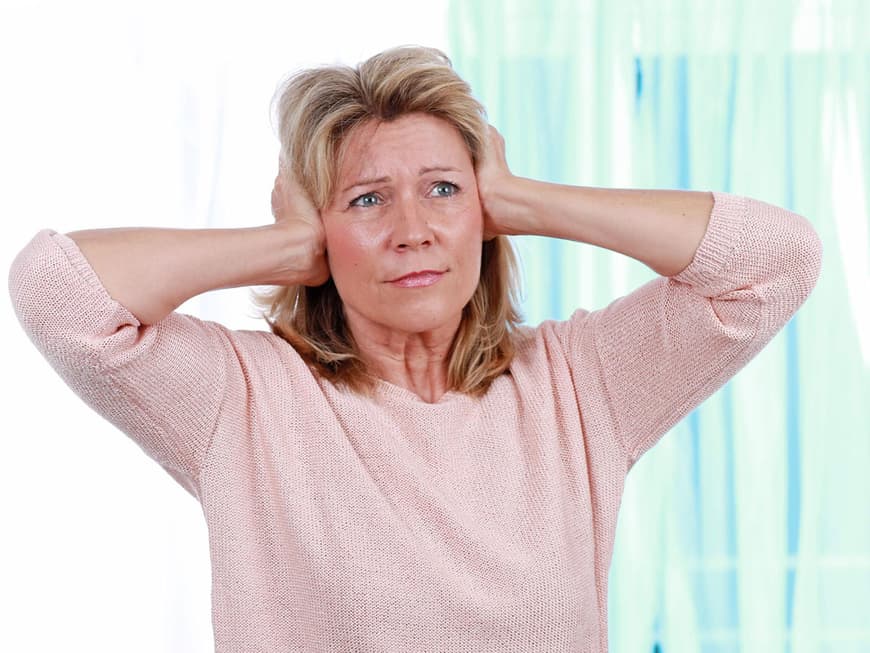
Noises still there after 72 hours? Go to the doctor
Almost everyone is familiar with ringing in the ears that appears briefly and then disappears again. In some people, however, they remain in the ear and head for hours or days and cause considerable discomfort. If the onset is less than three months ago, doctors speak of acute tinnitus (from the Latin tinnire = ringing, tinkling, ringing). However, this can develop into longer-lasting, chronic tinnitus.
The buzzing, humming or whistling in the ear drives those affected mad. Tinnitus is now a widespread disease and the numbers continue to rise: one in six Germans will experience ringing in the ears at some point in their lives. The ringing often goes away on its own, but for some people it becomes a lifelong companion. Around 15 to 20 percent of those affected suffer from a chronic form. Particularly worrying: 60 to 80 percent of young people have also experienced the "little man in the ear".
Ringing in the ears: causes and help
What exactly triggers tinnitus is still not fully understood. But scientists have a new assumption: the noises are not generated in the ear, but rather in the brain. So is it purely a matter of the head? What is certain is that there are different types of tinnitus - just as there are different types of headaches. However, ear noises can also be caused by diseases or disorders of the ear itself (e.g. earwax plug, sinus disease, sudden hearing loss), as well as other diseases such as high blood pressure, cardiac arrhythmia or cervical spine problems. Some medications can also cause the noises. Always take ear noises that occur for the first time seriously and ask yourself what they are trying to tell you. It usually helps to withdraw from the current situation and relax. However, if the noise has not disappeared after 72 hours, you should consult an ENT specialist. In the case of acute tinnitus, he or she will give you an infusion of medication to stimulate blood circulation. If an inflammation is suspected, cortisone will be prescribed. Sometimes tension is the cause, in which case physiotherapy can help.
What helps with tinnitus?
A special extract from ginkgo leaves (in "Tebonin 120 mg for ringing in the ears", pharmacy) has shown positive effects according to clinical studies. If the tinnitus persists, you should not be discouraged. Specially trained ENT doctors or psychotherapists can help you learn to accept the noise in your ears and deal with it better. There are also special hearing aids or sound modifiers that redirect your perception so that the noise in your ear fades into the background. Another approach is treatment with oxytocin. This relaxation hormone is administered by nasal spray. Magnetic field therapy also calms the overactive nerves in the ear. If the level of suffering is very high, cognitive behavioral therapy with five to 15 sessions often proves useful. Contact with self-help groups (can be found at www.tinnitusliga.de) can also be helpful, as can a stay in a clinic that specializes in the treatment of tinnitus.
Learn a relaxation technique
Many sufferers report that their tinnitus becomes louder and more annoying when they are under stress. In order to cope better with the stress, it can therefore be useful to learn a relaxation method, such as autogenic training, Jacobson's progressive muscle relaxation, yoga, Qigong or Tai Chi. We also know that we should try to pay as little attention as possible to noises. This often makes them quieter and therefore much more bearable. You can also get rid of the beeping with music: One to two hours of your favorite music a day should silence the little man in your ear. Special tinnitus apps are available in the App Store and on Google Play. The "Tinnitracks Basic Therapy", for example, offers digital help. It consists of a comprehensive online program. Patients learn coping strategies specially tailored to them via a cell phone app - step by step in daily goals. Your doctor, who also prescribes the therapy, accompanies you, if necessary with video consultations. The app was developed by Techniker Krankenkasse in collaboration with the German Association of ENT Doctors, among others. The service was launched as a pilot project in Baden-Württemberg, Bavaria, Hamburg, Hesse and North Rhine-Westphalia. Info: www.tk.de
You might also be interested in this:






